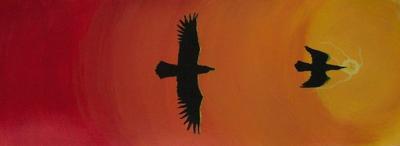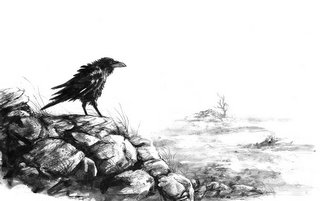Before there was anything, before the great flood had covered the earth and receded, before the animals walked the earth or the trees covered the land or the birds flew between the trees, even before the fish and the whales and seals swam in the sea, an old man lived in a house on the bank of a river with his only child, a daughter. Whether she was as beautiful as hemlock fronds against the spring sky at sunrise or as ugly as a sea slug doesn't really matter very much to this story, which takes place mainly in the dark.
Because at that time the whole world was dark. Inky, pitchy, all-consuming dark, blacker than a thousand stormy winter midnights, blacker than anything anywhere has been since.
The reason for all this blackness has to do with the old man in the house by the river, who had had a box which contained an infinite number of boxes each nestled in a box slightly larger than itself until finally there was a box so small all it could contain was all the light in the universe.
The Raven, who of course existed at that time, because he had always existed and always would, was somewhat less than satisfied with this state of affairs, since it led to an awful lot of blundering around and bumping into things. It slowed him down a good deal in his pursuit of food and other fleshly pleasures, and in his constant effort to interfere and to change things.
Eventually, his bumbling around in the dark took him close to the home of the old man. He first heard a little singsong voice muttering away. When he followed the voice, he soon came to the wall of the house, and there, placing his ear against the planking, he could just make out the words, "I have a box and inside the box is another box and inside it are many more boxes, and in
the smallest box of all is all the light in the world, and it is all mine and I'll never give any of it to anyone, not even my daughter, because, who knows, she may be as homely as a sea slug, and neither she nor I would like to know that."
It only took an instant for the Raven to decide to steal the light for himself, but it took a lot longer for him to invent a way to do so.
First he had to find a door into the house. But no matter how many times he circled it or how carefully he felt the planking, it remained a smooth, unbroken barrier. Sometimes he heard either the old man or his daughter leave the house to get water or for some other reason, but they always departed from the side of the house opposite to him, and when he ran around to the other
side the wall seemed as unbroken as ever.
Finally, the Raven retired a little way upstream and thought and thought about how he could enter the house. As he did so, he began to think more and more of the young girl who lived there, and thinking of her began to stir more than just the Raven's imagination.
"It's probably that she's as homely as a sea slug," he said to himself, "but on the other hand, she may be as beautiful as the fronds of the hemlock would be against a bright spring sunrise, if only there were enough light to make one." And in that idle speculation, he found the solution to his problem.
He waited until the young woman, whose footsteps he could distinguish by now from those of her father, came to the river to gather water. Then he changed himself into a single hemlock needle, dropped himself into the river and floated down just in time to be caught in the basket which the girl was dipping in the river.
Even in his much diminished form, the Raven was able to make at least a very small magic -- enough to make the girl so thirsty she took a deep drink from the basket, and in so doing, swallowed the needle.
The Raven slithered down deep into her warm insides and found a soft, comfortable spot, where he transformed himself once more, this time into a very small human being, and went to sleep for a long while. And as he slept he grew.
The young girl didn't have any idea what was happening to her, and of course she didn't tell her father, who noticed nothing unusual because it was so dark -- until suddenly he became very aware indeed of a new presence in the house, as the Raven at last emerged triumphantly in the shape of a human boychild.
He was -- or would have been, if anyone could have seen him -- a strange-looking boy, with a long beaklike nose and a few feathers here and there. In addition, he had the shining eyes of the Raven, which would have given his face a bright, inquisitive appearance -- if anyone could have seen these features then.
And he was noisy. He had a cry that contained all the noises of a spoiled child and an angry raven -- yet he could sometimes speak as softly as the wind in the hemlock boughs, with an echo of that beautiful other sound, like an organic bell, which is also part of every raven's speech.
At times like that his grandfather grew to love this strange new member of his household and spent many hours playing with him, making him toys and inventing games for him.
As he gained more and more of the affection and confidence of the old man, the Raven felt more intently around the house, trying to find where the light was hidden. After much exploration, he was convinced it was kept in the big box which stood in the corner of the house. One day he cautiously lifted the lid, but of course could see nothing, and all he could feel was another box.
His grandfather, however, heard his precious treasure chest being disturbed, and he dealt very harshly with the would-be thief, threatening dire punishment if the Ravenchild ever touched the box again.
This triggered a tidal wave of noisy protests, followed by tender importuning, in which the Raven never mentioned the light, but only pleaded for the largest box. That box, said the Ravenchild, was the one thing he needed to make him completely happy.
As most if not all grandfathers have done since the beginning, the old man finally yielded and gave his grandchild the outermost box. This contented the boy for a short time -- but as most if not all grandchildren have done since the beginning, the Raven soon demanded the next box.
It took many days and much cajoling, carefully balanced with well-planned tantrums, but one by one the boxes were removed. When only a few were left, a strange radiance, never before seen, began to infuse the darkness of the house, disclosing vague shapes and their shadows, still too dim to have definite form. The Ravenchild then begged in his most pitiful voice to be allowed to hold the light for just a moment.
His request was instantly refused, but of course in time his grandfather yielded. The old man lifted the light, in the form of a beautiful, incandescent ball, from the final box and tossed it to his grandson.
He had only a glimpse of the child on whom he had lavished such love and affection, for even as the light was travelling toward him, the child changed from his human form to a huge, shining black shadow, wings spread and beak open, waiting. The Raven snapped up the light in his jaws, thrust his great wings downward and shot through the smokehole of the house into the huge darkness of the world.
The world was at once transformed. Mountains and valleys were starkly silhouetted, the river sparkled with broken reflections, and everywhere life began to stir. And from far away, another great winged shape launched itself into the air, as light struck the eyes of the Eagle for the first time and showed him his target.
The Raven flew on, rejoicing in his wonderful new possession, admiring the effect it had on the world below, revelling in the experience of being able to see where he was going, instead of flying blind and hoping for the best. He was having such a good time that he never saw the Eagle until the Eagle was almost upon him. In a panic he swerved to escape the savage outstretched claws, and in doing so he dropped a good half of the light he was carrying. It fell to the rocky ground below and there broke into pieces -- one large piece and too many small ones to count. They bounced back into the sky and remain there even today as the moon and the stars that glorify the night.

The Eagle pursued the Raven beyond the rim of the world, and there, exhausted by the long chase, the Raven finally let go of his last piece of light. Out beyond the rim of the world, it floated gently on the clouds and started up over the mountains lying to the east.
Its first rays caught the smokehole of the house by the river, where the old man sat weeping bitterly over the loss of his precious light and the treachery of his grandchild. But as the light reached in, he looked up and for the first time saw his daughter, who had been quietly sitting during all this time, completely bewildered by the rush of events.
The old man saw that she was as beautiful as the fronds of a hemlock against a spring sky at sunrise, and he began to feel a little better.
Bill Reid, storyteller (1920 - 1998)





